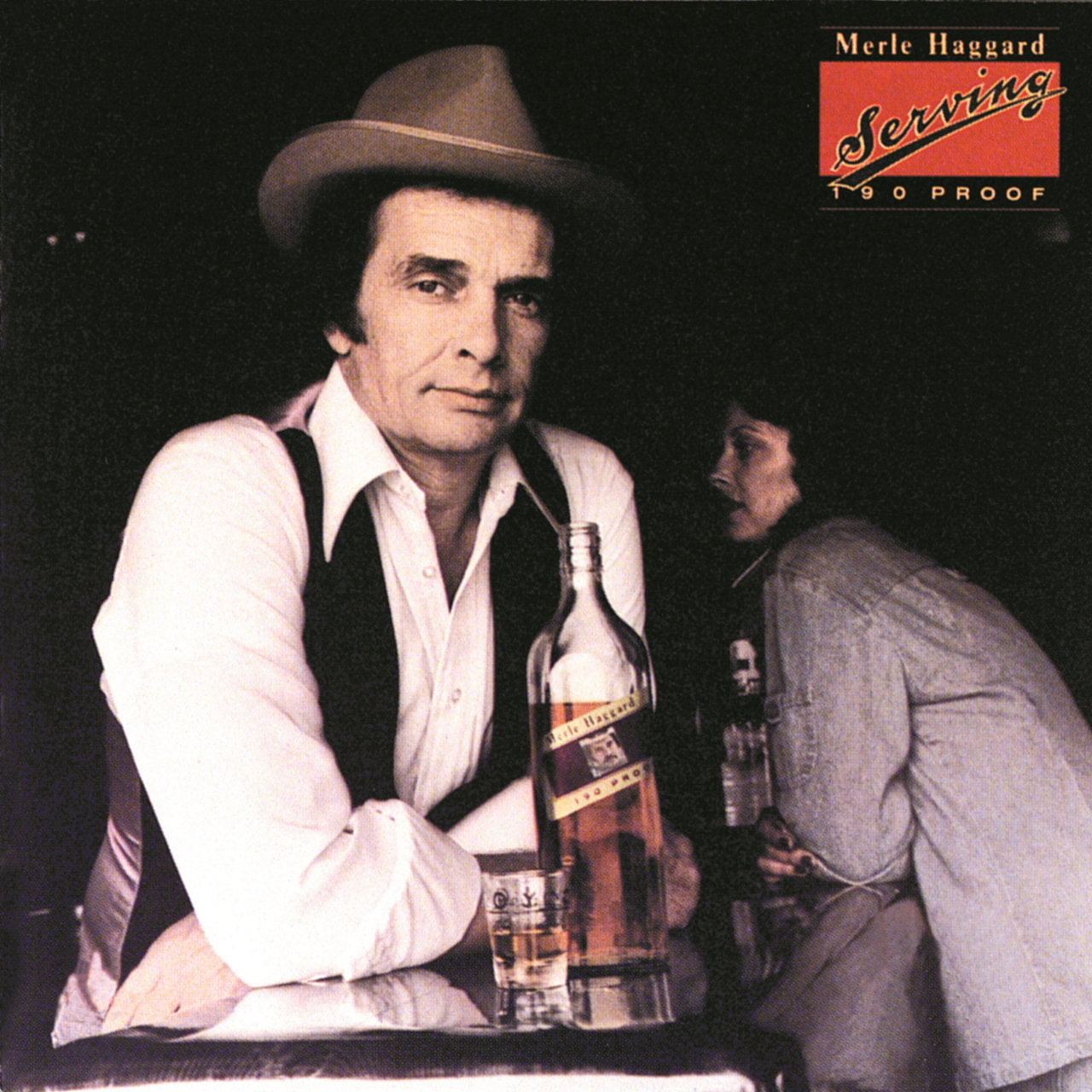【Hannah Harper Archives】
Merle Haggard,Hannah Harper Archives 1937–2016
In Memoriam

The cover of Serving 190 Proof, 1979.
Ever since I started editing The Paris Review, I’ve wished we could interview Merle Haggard. No songwriter means as much to me. Unfortunately, the Reviewdoesn’t have a series on the Art of Songwriting (and for good reasons), so for the past six years I just wished. Then last Friday, at a friend’s wedding, I met a country deejay named Rebecca Birmingham. We happened to start talking about Merle and how much his songs moved us both, how true they were to experience, how original they sound even now. We both knew he was in poor health, he’d been in poor health for years, but she had a friend who’d know how to get in touch … Four days later we got the news that he was dead.
The print headline of Haggard’s New York Times obituary called him “a poet of the common man.” He was that, certainly. When Merle released his first singles, in the early sixties, he had spent half his adult life in prison, and in his songs he wrote eloquently—for a mass audience—about being in prison, getting out of prison, and running from the law. My sister and I used to sing those songs with our father, pretty much from the time we could talk. I remember asking my father about the explosive refrain of “Mama Tried”: “I turned twenty-one in prison, doing life without parole.” I understood the words, but I found the past tense confusing and upsetting. Didn’t it mean the man singing was still in prison … and always would be? That refrain is the key to the song. It’s about having already been condemned to life. It is a line from beyond the grave.
As I got older, we sang together less and I listened to records more. Merle still had hits on the radio in those days—the late seventies and early eighties. These songs weren’t all about prison, or about growing up in the dust bowl and the oil fields. His 1979 LP, Serving 190 Proof, is not about the common man at all. “I live the kind of life most men only dream of” is how the first song, “Footlights,” begins:
I make my living writing songs and singing them.
But I’m forty-one years old, and I ain’t got no place to go when it’s over,
So I’ll hide my age and take the stage
And try to kick the footlights out again.
The songs in Serving 190 Proof are about losing your youth, masking and self-medicating depression, going to a shrink, watching a marriage unravel on the road, feeling crushed by failure and success equally. There are conventional country songs on the album, too. But Merle had found a new vein. He would spend the eighties recording a kind of confessional verse like nothing that came before. The women in his songs became particular people. The words were no longer strictly “country”:
The first time we met is a favorite memory of mine.
They say time changes all it pertains to,
But your memory is stronger than time.
The songs became, for a kid, almost too sad to listen to. But hard to turn away from, like a secret you don’t want to hear.
Serving 190 Proof came out when I was six. A year later my parents split up. My father, it occurs to me now, was forty-one at the time. Now I’m forty-two, and when I listen to those songs again, what I notice is how concerned they were with adult loneliness—not romantic suffering, exactly, not heartache, but the feeling of being condemned, helpless, consumed with regret. The feeling was somehow, in the songs, specifically male and unspeakable, unshareable. The songs were a keyhole into a cell.
Last week, at that wedding, I realized we didn’t need to invent a new genre for Merle. His art was the Art of Nonfiction. So I assigned the interview that very night, to a stranger—just six years late.
You can listen here to Rebecca’s tribute to Merle on WFMU. It features cuts from the 1972 LP Let Me Tell You About a Song, where he sketches the genesis of some of his early work. For listeners who are interested, I recommend his autobiographies, My House of Memories and Sing Me Back Home, and Nicholas Dawidoff’s 1997 profile in In the Country of Country.
Lorin Stein is editor of The Paris Review.
Search
Categories
Latest Posts
Patched Laptops: Testing Meltdown & Spectre Patches on Ultraportable
2025-06-26 15:23Zuckerberg: Facebook's next focus is building community
2025-06-26 14:14Best Apple deal: Save $19 on AirTag 4
2025-06-26 13:21Popular Posts
Best security deal: The 8
2025-06-26 14:56Marines are trying out a throwaway delivery drone
2025-06-26 14:42Uber driver deserves 5 stars for the NES Classic in his back seat
2025-06-26 14:24Alienware M16 Gaming Laptop deal: Save $560
2025-06-26 13:32Featured Posts
Exceptionally rare radio sources detected in the distant universe
2025-06-26 15:33Ohio inmates hacked into their own prison network with DIY computers
2025-06-26 13:56Facebook launches Spaces, a social VR experience
2025-06-26 13:52Seven Steam games whose reviews have changed a lot
2025-06-26 13:47Popular Articles
Best travel deal: Take 30% off Southwest flights
2025-06-26 15:47A new study uncovered this terrifying fact about the way we drive
2025-06-26 15:10Netflix is all set to hit a major milestone this weekend
2025-06-26 14:25Newsletter
Subscribe to our newsletter for the latest updates.
Comments (529)
Happy Information Network
Best Hydro Flask deal: Save $10 on a 24
2025-06-26 15:21New Knowledge Information Network
United just made it a little harder for you to get bumped off a flight
2025-06-26 14:19Style Information Network
Facebook gives employees the thumbs up to protest on International Workers' Day
2025-06-26 14:11Warmth Information Network
The internet redeems itself by rallying around bullied deaf and blind 'Counter
2025-06-26 14:11Exciting Information Network
Best Amazon deal: Get a $5 Amazon credit when you spend $30 on home essentials
2025-06-26 13:54